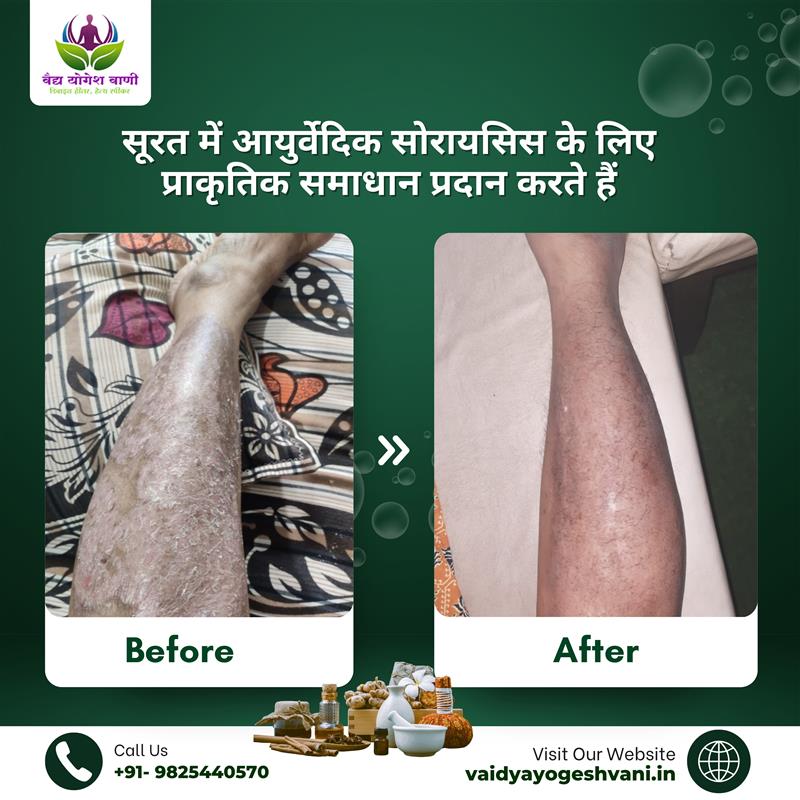Psoriasis Treatment in Surat
For psoriasis problems, are you looking for a natural, holistic treatment to help relieve psoriasis symptoms? If you are looking for an Ayurvedic doctor in Surat who may care for the patients individually. Contact Dr. Yogesh Vani, an esteemed Ayurvedic practitioner in Surat renowned for his expertise in treating psoriasis.
With extensive knowledge of Ayurveda, Dr. Vani treats psoriasis from the root cause with customized herbal medicines, dietary changes and lifestyle changes. His patient-centred approach ensures long-term relief and improved skin health.
Dr. Vani has built a reputation in Surat as a leading Ayurvedic practitioner for the management of psoriasis. Being the ayurvedic doctor for psoriasis in Surat, he provides his patients with expert advice and personalized treatment plans tailored to their unique needs.



Understanding Psoriasis: Causes & Symptoms
Psoriasis is a skin disorder in which red patches with silvery scales appear on the surface of the skin. In this skin condition, the immune system becomes very active. And, this active immune system causes skin cells to produce cells rapidly. These conditions are triggered by stress and infection. In some cases, exposure to cold temperatures, and some medications may lead to Psoriasis too.
The symptoms vary, but most commonly it is marked by itching, and burning. And, in some severe cases dry cracked skin that bleeds is noticed. If psoriasis is accompanied by joint pains it is referred to as psoriatic arthritis. It is possible to control the condition pretty well with appropriate treatment and early detection.
Psoriasis is not contagious. However, it requires careful monitoring and effective treatment as its effects may severely downgrade people’s quality of life. Severity may progress from mild to very bad. It is often seen with periods of exacerbations and remissions. The management of stress, diet, and skin care helps to alleviate the symptoms. Using ayurvedic psoriasis treatment in Surat is a good idea.
Psoriasis Treatment in Surat: Ayurvedic Approach by Dr Yogesh Vani
Ayurveda offers a holistic natural way of treating psoriasis. Dr. Yogesh Vani believes that Ayurvedic treatment, combined with herbal medicine, and diet changes may control the Psoriatic symptoms. Panchakarma detoxification cleanses the body’s toxins to provide relief for longer terms.
Research on Ayurvedic treatment focuses on balancing the doshas of the body by reducing inflammatory agents and preventing such relapse. Individualized therapy programs warrant positive results in several forms of psoriasis. Herbal drugs are most commonly referred to by doctors. Other than this, ayurvedic psoriasis solution in Surat also focuses on improving immunity by doing lifestyle changes.
Therapies like Abhyanga (oil massage) and Takradhara (medicated buttermilk therapy) are very useful for the treatment. Dr Yogesh Vani uses such techniques for psoriasis ayurvedic treatment in Surat. It cools inflamed skin and protects it from flare-ups. Besides symptomatic relief, overall wellness is targeted.

Types of Psoriasis Treated by Dr. Yogesh Vani
Dr. Yogesh Vani treats all types of psoriasis in Surat – plaque psoriasis, guttate psoriasis, inverse psoriasis, etc. He incorporates Ayurvedic principles and creates individualized treatments to address not only the symptoms but the root cause as well. Let’s check out all types of psoriasis treatment

Plaque Psoriasis
Plaque psoriasis is the most common type of psoriasis. It is characterized by red elevated patches oozing silvery scales. Commonly suffered sites are scalp, elbows, knees, and lower back. Ayurveda remedies bring relief from the flares by action against the inflammation. The best ayurvedic psoriasis doctor in Surat may treat plaque psoriasis.

Nail Psoriasis
Nail Psoriasis is very common. It involves damage to both fingernails and toenails. It makes fingernails and toenails discoloured and thickened. Sometimes fingernails and toenails are even separated from the nail bed. Ayurvedic medicines and herbal oils may strengthen the nails and improve their appearance. It is usually very difficult to treat nail psoriasis.

Guttate Psoriasis
Guttate Psoriasis comprises small red lesions resembling drops. It usually occurs after streptococcal infections and is treated with ayurvedic herbs to boost immunity and cleanse toxins from the body, as this will reduce any further flare. Guttate psoriasis is often found in young children and early adulthood, and proper treatment could even eradicate it.

Inverse Psoriasis
Inverse psoriasis usually presents as smooth, bright red patches found in the folds of the body, such as under the breasts, around the genitalia, and in the armpits. Ayurvedic topical applications and internal detoxification will help reduce the symptoms. Because the skin is sensitive, treatment includes very mild herbs and dietary modifications to avoid irritation.

Pustular Psoriasis
Manifesting as white pustules against a background of red skin, pustular psoriasis may cause pain and require intensive treatment. Personalized treatment is given by Dr Yogesh Vani to decrease its symptoms. Pustular psoriasis may be focal or diffuse; for that, systemic management may be required.
Book a Consultation with Dr Yogesh Vani
For better management of the problem, early treatment is essential for effective management of psoriasis. Contact Dr Yogesh Vani to consult an expert in Ayurvedic treatment for psoriasis in Surat. Personalized treatment leads to long-lasting relief and healthier skin. Advice from a specialist ayurvedic doctor in Surat like Dr Yogesh Vani can help to fight against Psoriasis.
Lifestyle modification, herbal remedies, and healing practices lead to prolonged periods of relief. Indeed, most of the patients benefited from symptom reduction with Ayurveda suggestions.
Here is the simple how you may book a consultation with Dr Yogesh Vani-
- By Call: Call to our customer support team to make an appointment.
- In-person booking: Come to our ayurvedic psoriasis clinic in Surat for in-person booking.
- Online: Book through the website.
- Assistance: Dr. Vani’s team will assist you in selecting an appropriate date and time.
- Start: Begin your journey toward effective psoriasis treatment today!
Meet Dr. Yogesh Vani – The Best Psoriasis Doctor in Surat
Dr. Yogesh Vani is an extremely experienced Ayurvedic physician whose years of practice in curing psoriasis have put him miles ahead among most practitioners in the country. Being the best psoriasis clinic in Surat, he has treated numerous patients with exemplary results through years of practice applying Ayurvedic treatments and natural herbs. He believes that each of his patients deserves a customized treatment plan as per their requirements.
Dr. believes that treating psoriasis from the inside, healing both internally and externally, is ideal. His holistic treatment provides the patients with mass care and holistic well-being aside from skin relief.
Patients from so many places, of Surat, and beyond, come to him for treatment against psoriasis. Having such a warm approach with such an in-depth understanding of Ayurvedic concepts should rightly qualify him as the best practitioner from the group to treat psoriasis patients in the city.

Benefits of Ayurvedic Psoriasis Treatment in Surat
There are a lot of benefits of using ayurveda for the Psoriasis treatment. Here is the list of benefits of Ayurvedic psoriasis treatment in Surat, Gujrat by Yogesh Vani

- Natural holistic treatment with no side effects.
- Detox therapies cleanse the body’s toxin load.
- Herbal remedies against inflammation and itching.
- Specially designed treatment programs attack the cause.
- Long-term effect without return of symptoms.
- Immune strength-boosting to reduce relapses in the future.
- Strengthened skin and balance through overall health and wellness.
Most of the patients have reported that their need for steroids and other drugs for psoriasis has decreased considerably with Ayurvedic therapy. Ayurveda does heal symptoms and makes one feel whole, confident, and comfortable in their skin. Hence, if you are noticing any Psoriatic symptoms you must reach your doctor. And, for effective treatment against all types of Psoriasis Dr. Yogesh Vani is always there to help you.
Common Questions Answered
Dr. Yogesh Vani treats all seasonal, skin, respiratory, food, and chemical allergies by the method of Ayurveda. He is professional in treating allergies. He works on the root cause of the allergies.
Each case is different in severity. Most people usually show improvement a few weeks after treatment. Being the best doctor for Psoriasis treatment in Surat, our treatment using Ayurvedic suggestions may improve the Psoriatic condition.
No, there is no permanent cure. But Ayurveda relieves the manifestation and keeps flares at bay. And it decreases the severity and motivates the patient for a healthy diet and lifestyle changes to fight against Psoriasis.
Yes. Ayurvedic treatments are safe and natural for everyone regardless of age. All treatments are herbal medicines and natural therapies. S, it is safe and effective for both kids and older patients.
Psoriasis needs a strict diet. Ayurveda suggests that consumption of fresh fruits, vegetables, and herbal teas may help relieve psoriasis. Anti-inflammatory foods may be helpful against Psoriasis. Hence foods such as turmeric, aloe vera, and amla may be included to fight against Psoriasis.
